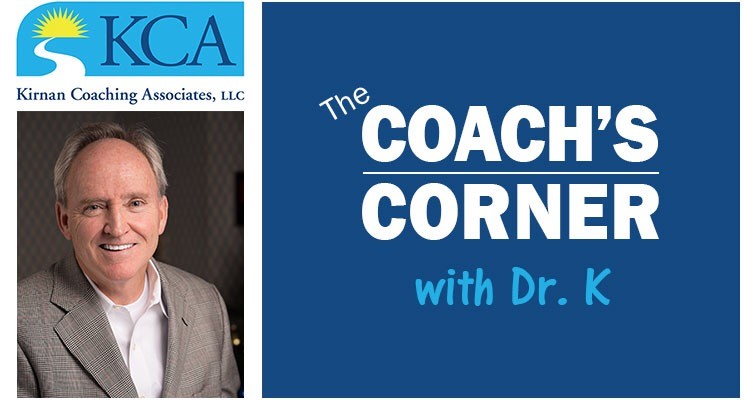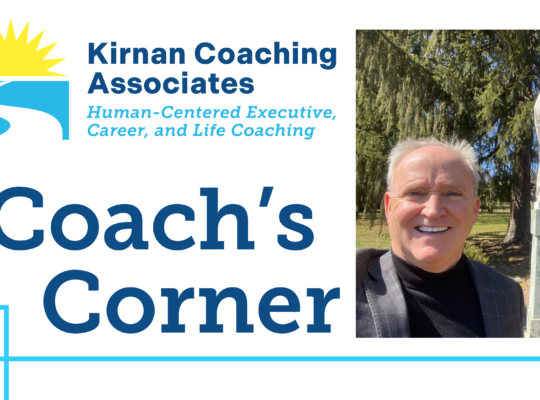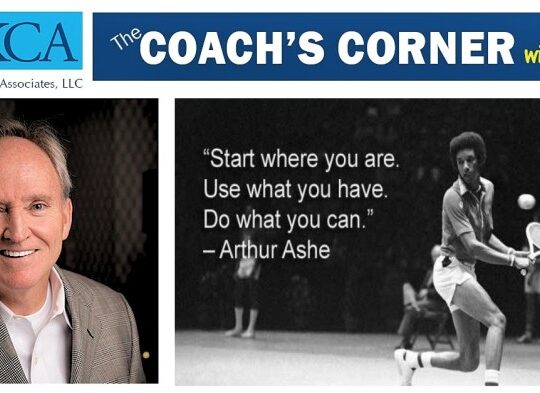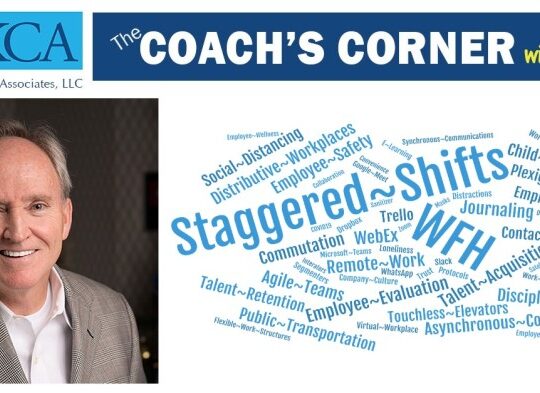Resilience — an ability to bounce back from unexpected adversity, loss, or change. A set of skills that allows one to thrive during and after the hard times.
Abstract
Why is it that some people, organizations, and even communities can face adversity, tragedy, loss, and the unexpected better than others and often come out of the experience stronger than ever? It’s a question that has always intrigued me as a professional coach. This article examines some recent research on resilience, offering practical strategies that can build and nurture your success. Among the more important factors in building your resilience are: 1) Leaning on your 3 F’s in difficult moments and transitions — i.e., your faith or spirituality, your family, and your friends; 2) Maintaining a sense of optimism through every challenge and transition; 3) Identifying the source of your stresses and understanding what that may reveal about you and others you interact with; 4) Discerning the meaning behind every challenge, loss, or transition and the willingness to write a new narrative in your unique story; and, 5) Investing in self-care and wellness to help center your mind, body, and spirit.
Wouldn’t It Be Nice If We Could All Be More Resilient?
To borrow the refrain from a great Beach Boys song from 1967, “Wouldn’t It Be Nice” if we could live our lives with less fear and anxiety, fully embracing each moment as it presents itself? To be able to experience something new every day while still honoring the treasured moments and experiences from our past? To be more open to whatever our creator decides to put in our path even when we don’t always understand it? To be able to bounce back faster from any loss, challenge, or setback that comes our way? Now wouldn’t that be the holy grail of becoming a more resilient person? It begs the question of whether one can become more resilient and if so, how?
Our basic understanding of resilience has evolved over the past 50 years from analyzing the specific behaviors, thoughts, and actions of people and communities who experience loss, unexpected adversity, and/or change. The research examines the specific coping skills that can effectively shorten the transition time in dealing with the loss or adversity and in the process, enhance the quality of our overall wellness. Importantly, more recent research indicates that these coping skills can be developed and strengthened over one’s lifetime and that older people may enjoy an inherent advantage based on their total life experience. The ability for any one person to bounce back from a difficult loss or change doesn’t always mean that they will return to the life they were living before the event but often it will involve a personal transformation, one that is more likely to ensue after an acknowledgement that the loss or change has occurred. Therefore, understanding resilience and the factors that can support it can greatly improve the lives, organizations, and communities that are impacted by such events.
In 1984, Kenneth Mitchell and Herbert Anderson published a groundbreaking book All Our Losses, All Our Griefs describing 5 common losses many of us will experience during our lifetime:
1. Material Loss — e.g., from having lost something of value that was perhaps stolen or lost in a fire or storm.
2. Relationship Loss — e.g., the loss of a spouse, parent, child, or friend; the loss from a divorce or separation; or, the loss of close family and friends who may have moved away from where one lives.
3. The Loss of an Important Role in Life — e.g., the job loss that often accompanies a company downsizing or restructuring. Sometimes the loss will precipitate a major career change and one’s assessment of their future economic security and well-being. There are also the many transitions we experience through life that often involve taking on a new role or leaving behind an old role we once occupied — getting married; becoming a parent; our adult children leaving the “nest”; caring for our aging parents; and, adjusting to our full-time retirement.
4. Systemic Loss — e.g., a loss which affects an entire organization or community. In the business world, a systemic loss could occur depending on how employees will respond to specific company events such as a shakeup in their company’s senior management team, a merger, a divestiture of a major division, or a significant restructuring or downsizing. That response will often dictate the degree of resilience within the organization. Many organizations will thrive in such situations because they take proactive steps to minimize the effect of the change on the entire system itself. Systemic losses can also be seen in how specific communities respond to unexpected tragedies such as the mass shootings of young schoolchildren in Newtown, CT in 2013 or in Parkland, FL earlier this year; to major disasters like the trio of 2017’s record-setting hurricanes in Houston, Puerto Rico, and the Virgin Islands; and to this summer’s disturbing revelations of massive sexual abuse in the Catholic dioceses of Pennsylvania over a 70-year period and the troubling behavior of the global ecclesiastical leadership in addressing this painful issue.
5. Functional Loss — e.g., the loss we experience from an injury, stroke, surgery, a physical impairment, or even the aging process itself and how these challenges impact our physical and mental capabilities.
Academic Research on Resilience Has Grown Substantially Over the Years
The initial academic research on the concept of resiliency focused on children with a groundbreaking study by Dr. Emmy Werner and her associates that tracked 698 children born in 1955 on the island of Kauai, HI over a forty-year period. Werner’s second book in the 4 volume, 40-year longitudinal study — The Children of Kauai (1977) —concluded that those children who had been born into adversity (e.g., an alcoholic parent, divorce), tended to adapt well and exhibit resilience if they had a stable role model in the household, held a strong belief in their ability to solve problems, and were also part of a stable community. More recently, academic research has tended to focus on adults, particularly the survivors of major tragedies like floods, fires, tsunamis, droughts, and men and women in the military who return home from active service. Neuroscientists have focused on the ability of people to rewire their brain by studying patterns of blood flow and through new techniques like magnetic resonance imaging and mindfulness as important predictors of future resilience. There are also several recent books on resilience that have had broad public and business appeal, perhaps none more impactful than Sheryl Sandberg and Adam Grant’s 2017 bestseller Option B: Facing Adversity, Building Resilience, and Finding Joy.
10 Coaching Strategies That Can Help Build Your Resilience During Transitions
Developing resilience gives us the hope that we can and will get through whatever challenge we are dealing with. Before addressing 10 specific coaching strategies that can help build your resilience throughout your life, several things seem clear at the outset:
• Most of us tend to accept change much better when it’s a change that we ourselves have put into motion rather than when the change has been imposed on us by some other entity.
• People journey through loss and change at a different pace and so it helps to acknowledge that fact upfront to whatever specific transitions may come our way.
• When faced with any unexpected adversity, loss, or change, we do have a basic choice. We can choose to avoid the event through escape or we can cope through it with the understanding that it’s all a part of our unique journey.
• Self-care is a critical factor in cultivating our resiliency throughout our life as it helps foster a healthy mind, body and spirit.
Here then are 10 effective coaching strategies that can build resilience in facing loss, change, or the unexpected and that can nurture your success for the future:
- Your Faith or Spirituality as an Important Anchor in Your Life. Research continues to show that people who hold a strong foundation in their faith or spirituality tend to cope better and be more resilient than those without faith as a foundation of their being. This factor helps explain why the health care field has been emphasizing a more holistic approach in the care of patients over the past 20 years, one that combines the physical aspects of medicine with a patient’s psychological and spiritual needs in evidence-based practice. Such an approach has been found to reduce levels of stress, anxiety, loneliness, and feelings of hopelessness. A recent documentary — Your Health: A Sacred Matter — examines the important relationship that religion, spirituality, and physical health play in how we heal, an approach that encompasses our body (physical), mind (emotional), and soul (spiritual). Music and film can also be a source of resiliency for us and provide the comfort and healing we are looking for. One recent spiritual song that really resonated for me is Benjamin James’s Beggar and its beautiful refrain “When I’m broken to pieces, you make me whole. Through every season, you’re mending my soul”. James is clearly appealing to a higher power that helps us tap into our innate feelings of brokenness and his belief that there is something greater that awaits us when we pass from the current, earthly life.
- The Importance of Family, Friends, and Developing Your Support Network— Having family and friends you can lean on to help you cope with whatever stress and difficult challenges you are facing is vitally important and one of the most significant attributes of resilient people. Spending time with your loved ones will help nurture yourself and asking for help from others is always a sign of strength, not weakness as many people you reach out to during your time of stress will be glad to help you in any way they can. Resilient people often move beyond their existing network of family and friends and offer their help to someone else who is also facing adversity in their own life. That very act of helping someone else builds up their self-esteem and confidence. One exercise my clients will often find helpful in our coaching engagements is to ask them to develop their own personal Board of Directors by identifying specific people in their personal and professional life who can help hold them accountable in both good times and in those instances where they are facing a major challenge. Knowing who one can turn to and what you can turn to them for can be extremely helpful when facing a major transition.
- Finding Meaning in Whatever Change, Trauma, or Loss You’ve Experienced. Even in situations where one may not know the reason for why this change, trauma, or loss has occurred, we can sometimes find meaning from these painful experiences. Maybe it stems from a belief that a higher power knows the reason why this is happening and so one can take some comfort in holding on to that belief. This spiritual dimension to finding the meaning during a difficult period in life reminds me of a deeply moving quote from Holocaust survivor Viktor Frankl: “We must never forget that we may also find meaning in life even when confronted by a hopeless situation when facing a fate that cannot be changed. For what then matters is to bear witness to the uniquely human potential at its best, which is to transform a personal tragedy into a triumph, to turn one’s predicament into a human achievement. When we are no longer able to change a situation, we are challenged to change ourselves”. People often experience dramatic personal transformation when facing a major challenge because they do find new meaning for their future. Their resiliency reflects the inherent message of the Serenity Prayer where we ask the Lord for the serenity to accept the things we cannot change, the courage to change the things we can, and the wisdom to know the difference. The hardest part in the transformation journey is acknowledging and accepting the fact that something indeed has changed in your life that we will not be able to control, but once we can do that, we can move forward. One book I highly recommend on this broader topic for anyone who is facing a major challenge or transition is Dr. Carol Dweck’s Mindset: The New Psychology of Success published in 2006. This groundbreaking book shows how a growth mindset can help build your resilience throughout life and lead one to greater success and achievement in the future.
- Maintaining a Sense of Optimism. Resilient people adopt a positive mindset and avoid seeing any current challenge or crisis as an insurmountable problem. For example, it’s very common for people who are in a job transition to lack self-confidence as the job search campaign ensues due to the inherit uncertainty that surrounds this stressful process. Yet, taking a more optimistic frame of reference is an opportunity to revisit one’s goals and vision for the future. I am always amazed at how willingly many of my clients view the job search mandate as an exciting opportunity to look more holistically at their Wheel of Life and where they can evaluate how the different components of their life (e.g., Career, Finances, Relationships, Physical Environment, Spirituality, Leisure Activities, and Personal Health) may actually be in alignment with a new direction they would like to take in the future. Surrounding yourself with people who embody optimism can also feed your own appetite for looking through every transition with a more optimistic lens. Resilient people also subscribe to that basic cognitive belief that you will get through this current period of difficulty, no matter what gets in the way. Once again, the world of music and film are littered with great examples of hope and maintaining optimism. One recent song that really struck a chord with me is I Lived from OneRepublic and that catchy refrain “I, I, I did it all. I, I, I did it all. I own every second that this world could give. I saw so many places the things that I did. With every broken bone, I swear I lived”. Every time I hear the song I visualize myself being able to live that beautiful and inspiring message through every experience I have, whether it’s a good one or a difficult one because each of us does own every second of our life so I want to make every second count!
- The Importance of Story Telling and Writing Your New Chapter. Often when dealing with loss or a difficult event in our life, we may feel as if someone ripped the pages out of what we thought our story was going to be? Psychologists and coaches refer to this phenomenon as a so-called narrative disruption and it begs the important question of how one can rewrite their story? After all, the story isn’t over yet as there are new, undeveloped chapters to explore. Going through a painful loss or unexpected challenge is an opportunity for us to begin a new narrative where we get the opportunity to rewrite the unfinished chapters to our unique story. Resilient people tend to avoid dwelling on things from the past and quickly understand that the unexpected change they are facing is not necessarily personal and often is something that is out of their direct control. They implicitly know that it is far more effective to focus on the future and those things they can be in control of. In a spiritual vein, resilient people find healing and redemption in receiving the sacrament of Reconciliation. Resilient people also tend to look at the present and the future as an opportunity for further self-discovery and personal growth. In rewriting that next chapter in our narrative, it’s important to recognize what makes us uniquely strong so we can take appropriate steps to own those strengths. And, while identifying and working on one’s perceived weaknesses is always helpful, it’s also vital that one can acknowledge and lead with their unique strengths.
- Acknowledge the Comebacks You Have Already Achieved. Often when the unexpected happens, we tend to neglect prior periods in our life or career where we faced a challenge and successfully navigated through it. Therefore, it’s important during difficult transitions to take the time and reflect on the comebacks you have already achieved. It is also helpful to keep a daily journal as a reminder to yourself of some of the blessings you may have neglected like the support of your family, friends, and colleagues. Setbacks and comebacks are part of the earthly journey and reminding yourself of those comebacks can be an effective way to build up your self-confidence and maintaining that optimistic view of the future mentioned earlier.
- Be Willing to Unpack the Source of Your Current Stress— When a setback or challenge presents itself, ask yourself whether the stress and anxiety that you are feeling is stemming from the job itself or is it coming from within because of the way you are wired or your personality? One exercise that my clients at Kirnan Coaching AssociatesLLC have found extremely helpful is to look at their Wheel of Work and to then identify which of the 8 specific factors (e.g., Compensation, Role & Responsibilities, Work Relationships, Work/Life Balance, Career Progression, Professional Development, Recognition & Level of Support, and Purpose & Passion) in their current role are either positive, negative, or unimportant? Often this assessment will reveal the specific source of where the stress might be coming from and can lead to a fruitful conversation of how one can take specific action steps that can reduce the stress. We also review past experiences that were stressful and hone in on what strategies worked to alleviate the stress. We ask specific questions like what events in the past have been the most stressful for you? Do you think of important people in your life when you get stressed? Do you really know what you have learned about yourself in these stressful situations and in your interactions with others? Do you feel better when you know that you have helped someone else get through a similar stressful experience? And, do you know what makes you feel more hopeful about the future? There’s often a lot to unpack but it can be so illuminating and can really identify where the stresses are coming from not just in everyday life but especially during difficult transitions.
- A Willingness to Get Out of Your Comfort Zone— In the great movie classic The Wizard of Oz, the central character Dorothy turns to her dog Toto and says “Toto, I’ve a feeling we’re not in Kansas anymore”. It’s an expression that many of us can relate to when difficulty or the unexpected sets in, meaning that we are confronted by something that is completely unfamiliar, discomforting, and well beyond our comfort zone. One strategy that clearly helps build your resilience is to identify something challenging that can help you get out of your comfort zone. For some people, it could be taking on a physical challenge like running that 5K, triathlon, bike ride, or hike that you always dreamed of but never had the time to do. For others, it might be to try something new like signing up for Toastmasters, learning how to play a musical instrument (for me it would be the bagpipes), or even taking that dance class (on my list for sure). Sometimes, the transition we are facing, particularly if it involves a period of unemployment, encourages us to commit to a new goal of lifelong learning to remind us that in the technology-driven world we live in, we need to take the initiative in keeping our skills and core competencies as current as we can. A willingness to invest in online courses or even certificate programs in a technical area can often help rebuild our confidence and make us more attractive to prospective employers.
- Setting SMART Goals with Specific Action Steps to Achieve Them. SMART Goals are really important when the transition we are facing involves some aspect of our career, particularly if we have either lost our position or feel we are in imminent danger. SMART Goals are Specific, Measurable, Achievable, Realistic, and Time-Bound. And, every SMART Goal needs to have a set of specific Action Steps that properly align and can support the achievement of the SMART Goal itself. Sometimes, new action steps will be developed as one goes through the transition process itself or the SMART Goal might even be dropped or modified as new information becomes available. It’s important to stay flexible and maintain an appropriate balance as you pursue and try different things during these major transition periods.
- Investing in Self-Care and Tapping Your Creative Talents. Taking care of oneself physically and emotionally during a major transition or difficult challenge is perhaps more important than any other coaching strategy in building one’s resilience. Resilient people make sure that they are getting enough sleep, exercise, proper nutrition, and frequently engage in the practice of meditation, do yoga, and spend the time they need to connect with their friends and family (Strategy # 3 above). Research also shows that tapping into one’s creative talents can also build your resiliency through a transition. Essentially, any habit that can help one center their mind, body and spirit will help alleviate the stress that comes with life’s major transitions.
Good luck in building your resilience and invest some time to see which of the 10 coaching strategies outlined above may work for you and the specific challenge or transition you may be facing. REMEMBER TO ALWAYS STAY POSITIVE. I KNOW YOU CAN DO IT!
Blessings to all my friends, colleagues, and clients,
Dr. K






